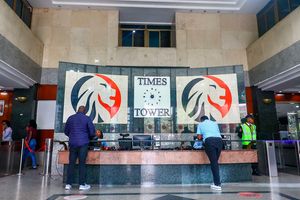
Times Tower, the Kenya Revenue Authority's head office in Nairobi.
The government has lost Sh62.9 billion in revenue over the past three years with refined edible palm oil cargo shipped from Malaysia but misdeclared as crude palm oil at the port of Mombasa so as to evade paying the requisite taxes.
The importation of the product is intended for use in Kenya, Uganda, Tanzania and Rwanda.
In Kenya, 35 percent duty is charged on imported refined palm oil with semi refined palm oil attracting a 10 percent duty.
Documents before the Trade, Industry and Cooperatives Committee of the National Assembly that is investigating the matter and that are in our possession show that the palm oil imported by Louis Dreyfus Company (LDC) is misdeclared in two ways.
First, the product, a blend of 60 percent crude and 40 percent refined palm oil, is declared as crude palm oil. Alternatively, it is imported in refined form but declared as crude palm oil to evade the 35 percent import duty or $500 charged per tonne.
The oil also attracts Import Declaration Fee (IDF) at the rate of 2.5 percent, Railway Development Levy of 1.5 percent and Value Added Tax (VAT) 16 percent.
The documents show that, in 2022 the government lost Sh16.5 billion in revenue from the 233,000 metric tonnes that were misdeclared as crude palm oil and Sh32.54 billion in 2023 from the 387,868 metric tons that have been misdeclared. This year, the government has so far lost Sh13.83 billion in revenue from the 163,567 metric tonnes.
The LDC has offices in Mombasa and is one of the country’s leading vegetable oils merchandisers with a growing footprint across East Africa.
Palm oil products
It’s a major importer of palm oil products for millers and refineries in East Africa and operates one of the largest oil seed storage facilities in the region. The firm, which has no contacts on its website and whose available telephone numbers could not go through, is among the entities listed for questioning by MPs on the matter.
The palm oil cargo imported from Malaysia and Indonesia, the world’s two leading exporters of palm oil products that accounts for 85 percent of the production, comes in six types; RBD palm olein, RBD palm stearin, crude palm kernel oil, crude palm olein, crude palm oil and palm fatty acid distillate. Palm oil stearin is a by-product of palm oil refining as is used in soaps manufacture and cooking fats. RBD palm olein is refined palm oil, crude palm kernel oil is a by-product that is used in soap manufacturing.
Crude palm olein is palm oil that has been semi processed, which means that it has only been fractioned to separate the liquid portion from the solid portion of oil and attracts import duty at the rate of 10 percent.
Crude palm oil is unprocessed oil which requires full processing.
Palm fatty acid distillate is a by-product of palm oil refining and is used to make brown soaps.
This means that, were the product to be imported in crude form, the country would benefit as the by-products from the refined oil would help the soap manufacturing among others.
SGS, with offices in Mombasa and Nairobi, is the world’s leading inspection, verification, testing and certification company with a state of the art multi-laboratory at the coastal city. SGS carries out inspection, verification and certification of imports.
A report from the load port undertaken by SGS shows that 8,330 metric tonnes of RBD palm olein were loaded onto MT Atrotos, an LDC chartered ship, from Port Klang in Malaysia to Mombasa.
The report shows that the vessel berthed at Port Klang on May 6, 2024 at 0518 hours and the tanks were inspected and accepted on the same day at 1100 hours with hoses also connected on the same day at 2200 hours.
Loading started on May 6, 2024 at 2242 hours and completed on May 7, 2024 at 2300 hours. However, there was no declaration of refined product on the ship when it arrived in Mombasa on May 21, 2024.
Instead, the ship was declared to be carrying crude palm oil in bulk, which means that the manifest could have been changed on arrival. Also declared abode the vessel included 1,120 metric tonnes of palm fatty acid distillate. The vessel’s tracking data also presented before the National Assembly shows that it loaded 8,330 tonnes of refined olein (finished product) at Port Klang.
Refined cargo
After the ship finished loading in Malaysia, it came straight to the port Mombasa with no other stops, meaning that the refined cargo was offloaded in Mombasa.
The documents also show that the cargo was meant for 12 consignees but it is not clear whether LDC sold the misdeclared product with the client’s knowledge or not.
Mr Paul Musyoki from the Natural Resources Oil, Gas and Chemical Commodities department at SGS said: “Kindly note that the requested information is not within the scope of our inspection services” after we sought a comment from SGS on whether refined palm oil is imported and misdeclared as crude.
To promote local value addition, Indonesia and Malaysia have imposed a $70 per tonne of crude palm iil exports with no export duty on refined palm oil.
This means that the importers of the product save the $70 per ton duty when exporting refined palm oil from Indonesia or Malaysia and 35 percent import duty when declaring the cargo as crude palm oil in Kenya.
Because the oil is blended, the local processing costs are reduced and, as such, the companies stand to benefit immensely as the government losses.












